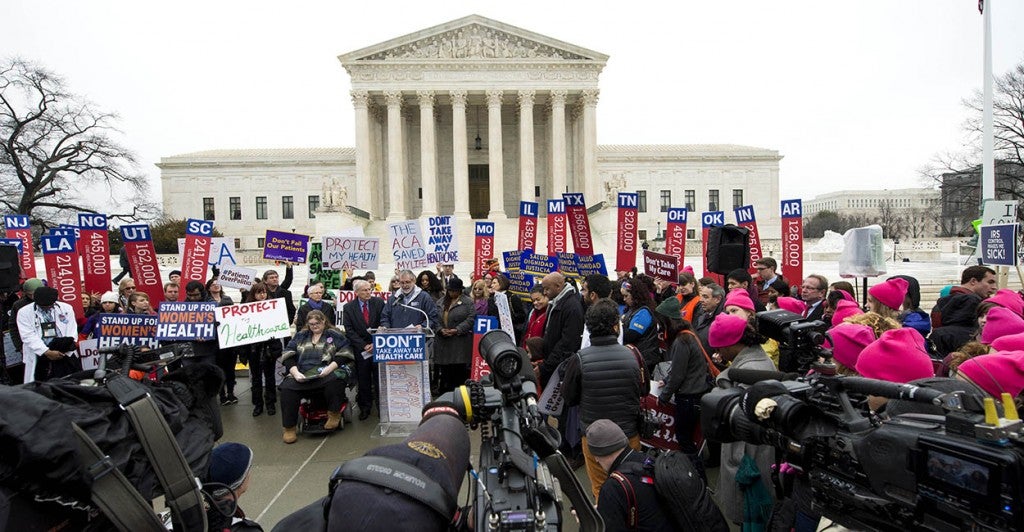Today the Supreme Court heard oral argument in King v. Burwell, an important case dealing with the Obama administration’s attempt to hand out tax credits not authorized by the text of the law.
This is the third appearance of Obamacare before the Supreme Court and the justices were so intrigued by the case that Chief Justice John Roberts extended the time for both sides to make their presentations as the case was being argued.
There was a huge scrum of reporters and television cameras on the plaza outside of the Supreme Court building and a large number of protesters, including Tea Partiers protesting over the IRS’s involvement in their health care.
In brief, Section 1311 of Obamacare grants tax credits to individuals who purchase health insurance on exchanges “established by the State.” However, when the majority of states refused to set up Obamacare exchanges, the federal government stepped in and set up federal exchanges. So far so good. However, the IRS then began authorizing tax credits for individuals on the federal exchanges, despite the fact that the text of the law authorizes tax credits only for state-run exchanges.
The IRS was challenged by Virginia residents (a state which didn’t set up an exchange) who don’t want to receive the subsidy because, with it, they will be obligated to buy insurance or pay a penalty pursuant to the individual mandate (both of which they object to), but would be eligible for an “affordability” exemption from that mandate without the subsidy.
The case was the only one heard today by the Supreme Court. Mike Carvin, the lawyer representing the challengers, gave a tour de force performance under heavy siege by the liberal justices on the Court. They almost immediately sought to divert attention away from the plain language of the statute, which is unambiguously in conflict with the position taken by the IRS and the administration, by asking questions about the supposedly dire consequences that could ensue if the Court rules against the government. Of course, this is a policy issue that should have nothing to do with the legal question at issue. As Carvin said in his very first words at the podium, “This is a straightforward case of statutory construction where the plain language of the statute dictates the result.”
Right out of the gate, however, Justice Ruth Bader Ginsburg raised an issue that has been in the news recently but which had not even been mentioned or raised in the Justice Department’s brief. Early last month, a number of left-wing outlets began to argue that the plaintiffs did not have standing to challenge the IRS rule because they had not suffered any injury.
Carvin dismissed this as an issue, but Solicitor General Donald Verrilli appeared to vacillate. On the one hand, he did not want to concede an argument that might help the government win. On the other hand, it would be difficult to contest standing at this point due to the factual finding of standing by the lower court and the fact that the government had not raised the issue before the Supreme Court.
Two interesting lines of argument came up today. First, Justice Sonia Sotomayor unveiled a somewhat bizarre constitutional avoidance argument that did not make it into the briefs of either party. She claimed that if the tax credits were unavailable in the states with federal exchanges, this would be unconstitutionally “coercive” of traditional state authority by politically forcing them to set up exchanges. She used the popular phrase “death spiral” to describe what would happen to state insurance markets if the challengers won. Surprisingly, this argument appeared to appeal to Justice Anthony Kennedy, one of the purported swing votes in this case (the other being the chief justice).
Of course, the problem with this argument is that prior cases involving coercion of states by the federal government have involved programs where state governments would lose federal dollars if they did not comply with federal requirements. But here, there are no federal dollars going to state governments that can be used to “coerce” their behavior – the federal tax credits are payable to individuals.
Justice Elena Kagan also posed an odd hypothetical in which she tried to compare the problem of state exchanges vs. federal exchanges and federal tax credits to her assigning the writing and editing of a legal memo to her three law clerks, when one of them is unable to complete the assignment.
Her point seemed to be that it would not matter who ended up doing the work and that was comparable to it not being important for purposes of Obamacare subsidies whether the state or the federal government set up the exchange.
Carvin gamely answered the hypothetical, noting that while Justice Kagan may be indifferent as to who writes the brief, Congress was not indifferent as to who set up the exchanges when it drafted the Obamacare statute. Justice Samuel Alito noted that it certainly would matter to him to know which of the law clerks wrote a brief. He would not assume “it was written by Will, because Amanda stepped into Will’s shoes” and wrote it for Will.
In general, there was a great deal of discussion over an hour and a half about the language of the specific provision on exchanges, whether the text should be interpreted differently based on the overall structure of the statute, and on the possible effect on the insurance market and individuals of a finding that no tax credits can be provided through the federal exchange.
The courtroom was packed with a who’s who of Washington insiders listening to the spirited debate, from Sen. Orrin Hatch, R-Utah, to Sen. Ben Sasse, R-Ne., to former Secretary of Health and Human Services Kathleen Sebelius.
How the Court will rule is anyone’s guess, but we will likely hear one way or another by the end of June, when the Supreme Court’s current term ends.
